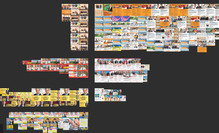 Political leaflets from each of the parties shows the ruling far-right Alliance for the Future of Austria (BZOe) with the largest proportion of advertising Credit: Gorg Holzer
Political leaflets from each of the parties shows the ruling far-right Alliance for the Future of Austria (BZOe) with the largest proportion of advertising Credit: Gorg Holzer The origin of Holzer's enquiry dates back to early 2009, during the run-up to regional elections in the remote south western province of Carinthia.
The volume of local authority-sponsored print advertising, posters and radio spots surged, the bulk of it serving party election campaigns.
"They had exactly the same graphical elements, the same fonts and the same overall feel as party advertising," Holzer says.
A rough tally gathered from one newspaper, pictured, shows the ruling far-right Alliance for the Future of Austria (BZOe) benefited from more than five times the amount of state advertising than the Social Democrats (SPOe), the next biggest party locally.
The BZOe, the one-time political vehicle of populist leader Joerg Haider, who died in a drunken car crash in October 2008, was investing "so much taxpayers money in advertising that it was unbelievable at first sight", says Holzer.
"The amount of advertising was so big that you might suspect that it amounted to a manipulation of the vote," Holzer says. A back-of-the-envelope calculation would put the total at around €10m, or around €18 for every man, woman and child in the province.
The spending helped BZOe scoop up 45 per cent of the vote in the March election and the SPOe hold on to 17 per cent, a drop of 10 percentage points. Many had predicted that the death of the BZOe's charismatic leader the year earlier might be the end for the party.
On route to the constitutional court Holzer's request for figures has been rejected twice on the grounds it would cost too much to calculate them.
"If they really wanted the public to know these numbers, they would only need to press a couple of buttons on a keyboard.
"When it is politically in favour of the ruling BZOe they are not shy in counting."
A request from the far-right Carinthian Freedom Party about the level of state backed advertising favouring the Social Democrats is being processed with little fuss.
Austria has no freedom of information act to put the onus on its government institutions to justify the denial of information. It is the only one of the 27 countries in the EU in which state secrecy is enshrined in the constitution. Party funding, too, is a closely guarded secret.
"If you don't have to disclose anything, you can do anything," Holzer says.
Holzer hopes the constitutional court might deliver its ruling on his case in autumn, which would make it almost exactly two years after he made his initial request.
"Some lawyers think there is a good chance of winning. I'm not convinced yet," he says.
And even victory in court may not be the end of it. Austrian institutions often consider themselves above the law, particularly in Carinthia. "I have no legal power afterwards. All I have is that they should give me the numbers. If they don't, what then?"
The Carinthian authorities only agreed to erect signs in the Slovenian language this April, 56 years after the constitution first required it. And the number of bilingual signs still falls short of the number promised by the constitution, which is being re-written to suit.
A ruling in favour of Holzer's case could still be significant, with politicised state-advertising endemic at all levels. The Green party has lodged a request like Holzer's in "Red Vienna", where the Socialists have used the same excuse as the BZOe has in Carinthia.
It could even help bring more clarity at the national level, where politicised advertising supplements a formal state subsidy given according to a paper's circulation.
"This could be a case for more transparency in Austria," says Holzer. "There is a big difference between black and white in Austria, but there would be less if the court's decision came down in favour of disclosure."
Image by Georg Holzer on Flickr. Some rights reserved.
Related content:
Bastiat prize fund increase £43,000
BBC reiterates appeal for release of detained journalist
Campaigners call for UK support against changes to EC transparency rules
Free daily newsletter
If you like our news and feature articles, you can sign up to receive our free daily (Mon-Fri) email newsletter (mobile friendly).
Related articles
- OMG is it that time again? The tax troubles of a freelancer
- How to build a successful working relationship with editors
- How to take your first steps into investigative journalism
- Developing a new agenda: international reporting by women of colour
- 10 portfolio and publishing platforms for freelancers









